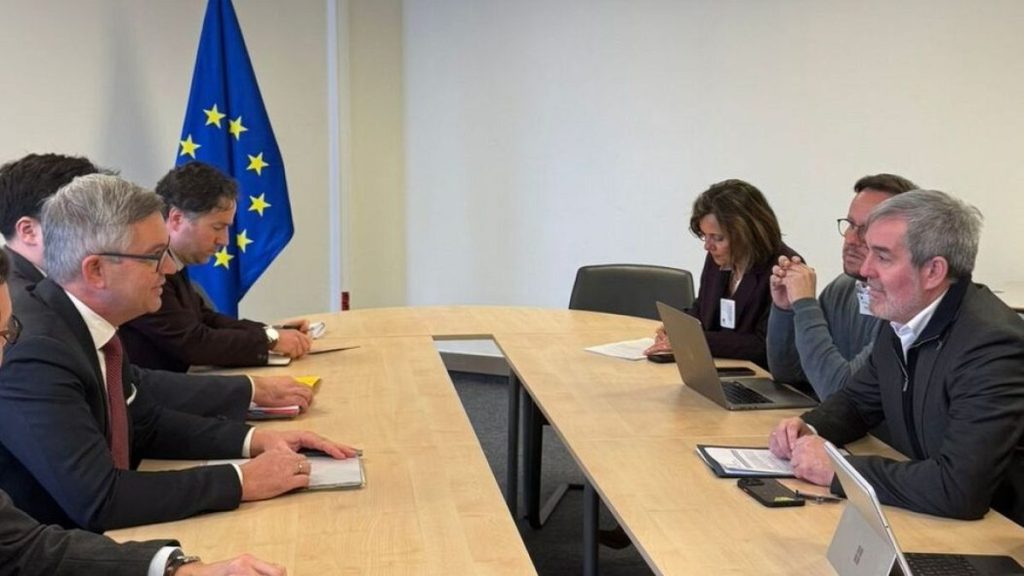The Canary Islands, a Spanish archipelago off the coast of Western Africa, is grappling with an unprecedented surge in irregular migration, a crisis that its regional president, Fernando Clavijo, argues is being overlooked by the European Union. Clavijo recently met with EU Home Affairs Commissioner Magnus Brunner in Strasbourg to plead for greater attention and assistance, emphasizing that the Canary Islands are experiencing an “absolute overflow” of migrants arriving via the Atlantic route, while the EU’s focus remains predominantly on the Mediterranean. He stressed that the migrants landing in the Canary Islands are not just Spain’s responsibility, but Europe’s, and called for solidarity and a more equitable distribution of resources and responsibilities.
The influx of migrants to the Canary Islands has intensified as other routes into Europe have been increasingly restricted. This “communicating vessels” effect, as Clavijo calls it, has resulted in a dramatic increase in arrivals via the Western Africa route, with nearly 47,000 migrants arriving in 2024, an 18% increase compared to the previous year. Tragically, this route also witnessed a significant loss of life, with varying estimates from NGOs and international organizations placing the death toll between 1,062 and 9,757. While overall irregular migration to the EU decreased in 2024, the Canary Islands experienced the opposite, creating immense strain on the archipelago’s resources and infrastructure.
The situation is particularly challenging for the island of El Hierro, the westernmost of the Canary Islands, which has a population of just 10,000 but received nearly 30,000 migrants last year. While adult migrants typically stay in the archipelago for a short period before being transferred to mainland Spain, unaccompanied minors remain in the Canary Islands, placing a further burden on the regional government. Currently, the islands are hosting over 5,800 unaccompanied minors, with about a thousand expected to be granted refugee status. Clavijo emphasizes the unfairness of this burden falling solely on the Canary Islands, especially given the limited resources and the uncertainty surrounding future arrivals. He warns of growing discontent among the local population, despite their history of emigration and understanding of the migrant experience.
Clavijo is seeking solutions at both the national and European levels. From the Spanish government in Madrid, he demands an automatic distribution mechanism for migrants when regional capacity is exceeded, an extraordinary relocation of unaccompanied minors, and adequate financial resources to manage the influx. He has specifically criticized the insufficient funding provided by the central government, claiming that they received only €50 million while needing €184 million to care for the unaccompanied minors. Clavijo has warned of deteriorating relations with Madrid if these demands are not met, highlighting the political tension between his regional coalition government, which includes the center-right Partido Popular, and Prime Minister Pedro Sánchez’s socialist PSOE party.
At the European level, Clavijo is calling for the redistribution of migrants arriving in the Canary Islands among EU member states, the deployment of Frontex, the European Border and Coast Guard, to the Atlantic islands, and greater cooperation with Western African countries to address the root causes of migration. He argues that distributing the 5,800 unaccompanied minors across Europe is a manageable task, while concentrating them in the Canary Islands makes it impossible to provide adequate care. He also advocates for a more development-focused approach in EU agreements with African countries, emphasizing that preventing people from seeking a better future requires addressing underlying economic issues rather than simply building walls or strengthening border controls. Clavijo specifically points to the delayed disbursement of €210 million promised to Mauritania by the EU, highlighting the need for more effective implementation of aid packages.
Clavijo’s call for Frontex deployment presents complex challenges. Deploying Frontex within the Canary Islands requires a request from the Spanish government, which has yet to be made. Commissioner Brunner has promised to discuss this with Spanish authorities. Extending Frontex operations to Western African countries is even more intricate, requiring a working agreement between the EU and the specific country, approved by both the Council and the European Parliament. Currently, Frontex operates in only two African countries: Nigeria and Cape Verde. The success of Clavijo’s appeals for assistance will depend on the willingness of both the Spanish and EU authorities to acknowledge the severity of the situation in the Canary Islands and to implement concrete measures to address the growing migratory pressure.














